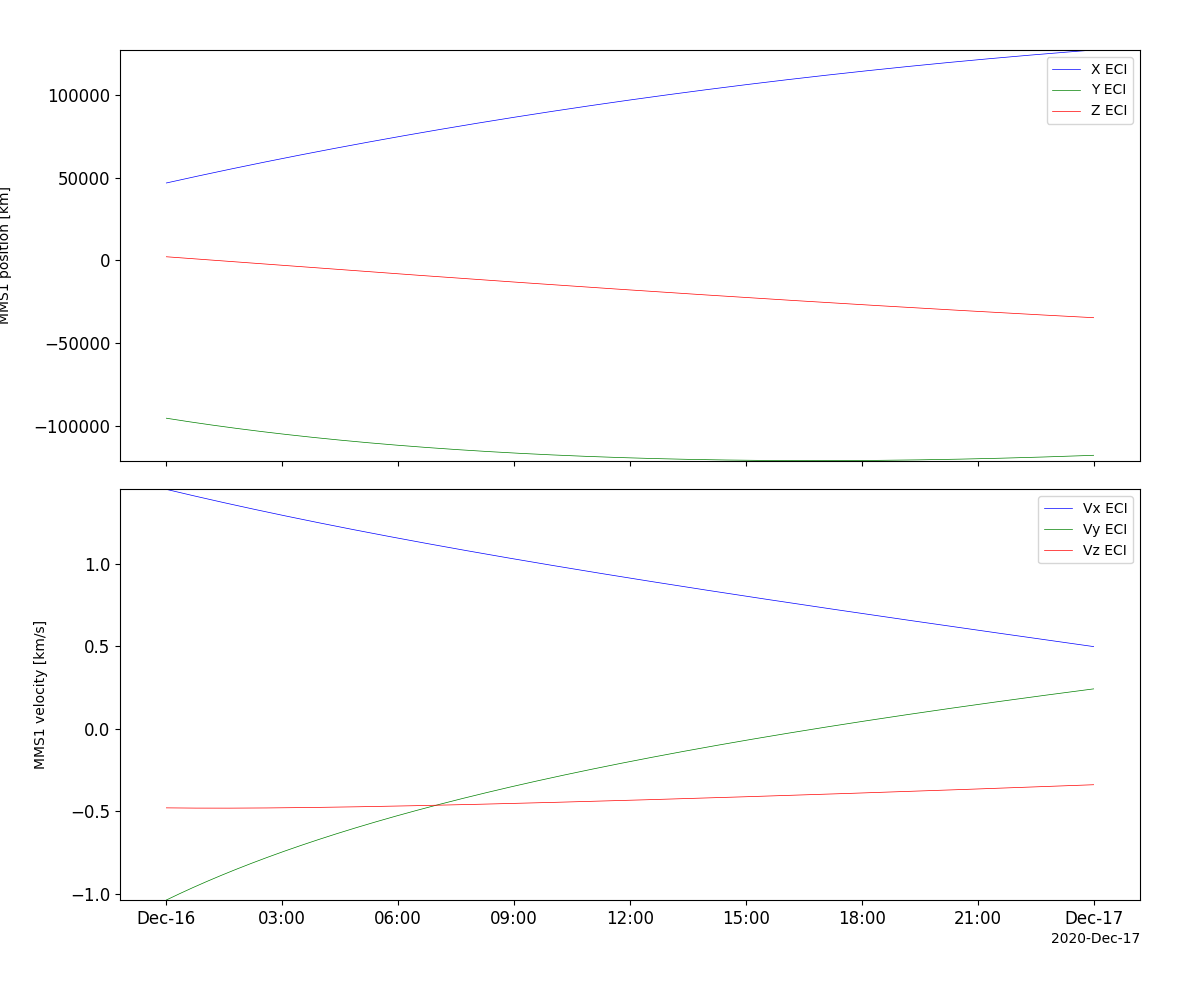Magnetospheric Multiscale (MMS)
The routines in this module can be used to load data from the Magnetospheric Multiscale (MMS) mission.
Fluxgate Magnetometer (FGM)
- pyspedas.mms.fgm(*args, **kwargs)
Load MMS fluxgate magnetometer data
- Parameters:
trange (
listofstr) – time range of interest [start time, end time] with the format ‘YYYY-MM-DD’,’YYYY-MM-DD’] or to specify more or less than a day [‘YYYY-MM-DD/hh:mm:ss’,’YYYY-MM-DD/hh:mm:ss’] Default: [‘2015-10-16’, ‘2015-10-17’]probe (
strorlistofstr) – list of probes, valid values for MMS probes are [‘1’,’2’,’3’,’4’]. Default: ‘1’data_rate (
strorlistofstr) – instrument data rates for FGM include ‘brst’ ‘fast’ ‘slow’ ‘srvy’. The default is ‘srvy’. Default: ‘srvy’level (
str) – indicates level of data processing. the default if no level is specified is ‘l2’ Default: ‘l2’datatype (
strorlistofstr) – Do not use: defined only for consistency with other load routines. All FGM data will be loaded. Default: ‘’get_support_data (
bool) – Data with an attribute “VAR_TYPE” with a value of “support_data” will be loaded into tplot. Default: Truetime_clip (
bool) – Data will be clipped to the exact trange specified by the trange keyword. Default: Falsevarformat (
str) – The file variable formats to load into tplot. Wildcard character “*” is accepted. Default: None (all variables are loaded)exclude_format (
str) – Variables matching this pattern will not be processed while loading the CDFs. Wildcard character “*” is allowed. Default: ‘rdeltahalf’varnames (
listofstr) – List of variable names to load. If list is empty or not specified, all data variables are loaded. Default: []suffix (
str) – The tplot variable names will be given this suffix. Default: Nonenotplot (
bool) – If True, then data are returned in a hash table instead of being stored in tplot variables (useful for debugging, and access to multidimensional data products) Default: Falseavailable (
bool) – If True, simply return the available data files (without downloading) for the requested parameters Default: Falseno_update (
bool) – Set this flag to preserve the original data. if not set and newer data is found the existing data will be overwritten Default: Falsecdf_version (
str) – Specify a specific CDF version # to load (e.g., cdf_version=’4.3.0’) Default: Nonemin_version (
str) – Specify a minimum CDF version # to load Default: Nonelatest_version (
bool) – Only grab the latest CDF version in the requested time interval Default: Falsemajor_version (
bool) – Only open the latest major CDF version (e.g., X in vX.Y.Z) in the requested time interval Default: Falsekeep_flagged (
bool) – If True, don’t remove flagged data (flagged data are set to NaNs by default, this keyword turns this off) Default: Falsealways_prompt (
bool) – Set this keyword to always prompt for the user’s username and password; useful if you accidentally save an incorrect password, or if your SDC password has changed Default: Falsespdf (
bool) – If True, download the data from the SPDF instead of the SDC Default: Falseget_fgm_ephemeris (
bool) – Keep the ephemeris variables in the FGM files Default: False
- Return type:
Listoftplot variables created.
Example: >>> import pyspedas >>> from pytplot import tplot >>> fgm_vars = pyspedas.mms.mms_load_fgm(trange=[‘2015-10-16’, ‘2015-10-17’]) >>> tplot(‘mms1_fgm_b_gsm_srvy_l2’)
FGM Example
import pyspedas
from pytplot import tplot
pyspedas.mms.fgm(trange=['2015-10-16/12:45', '2015-10-16/13:00'], time_clip=True)
tplot(['mms1_fgm_b_gsm_srvy_l2_btot', 'mms1_fgm_b_gsm_srvy_l2_bvec'])
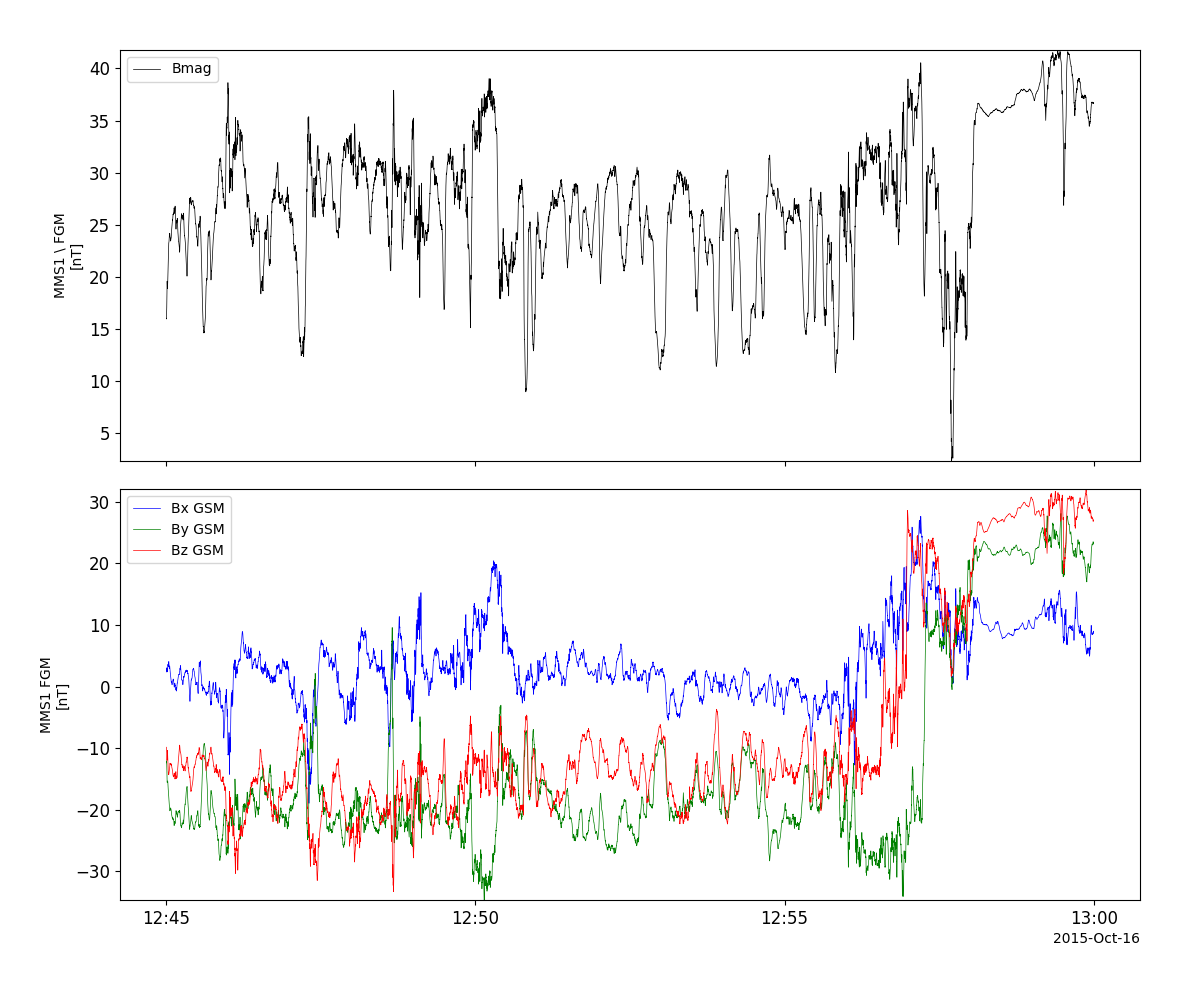
Search-coil Magnetometer (SCM)
- pyspedas.mms.scm(*args, **kwargs)
Load data from the MMS Search Coil Magnetometer (SCM)
- Parameters:
trange (
listofstr) – time range of interest [start time, end time] with the format ‘YYYY-MM-DD’,’YYYY-MM-DD’] or to specify more or less than a day [‘YYYY-MM-DD/hh:mm:ss’,’YYYY-MM-DD/hh:mm:ss’] Default: [‘2015-10-16’, ‘2015-10-17’]probe (
strorlistofstr) – list of probes, valid values for MMS probes are [‘1’,’2’,’3’,’4’]. Default: ‘1’data_rate (
strorlistofstr) – instrument data rates for SCM include [‘brst’ ‘fast’ ‘slow’ ‘srvy’]. Default: ‘srvy’level (
str) – indicates level of data processing. the default if no level is specified is ‘l2’ Default: ‘l2’datatype (
strorlistofstr) – Valid datatypes for SCM are: [‘scsrvy’, ‘cal’, ‘scb’, ‘scf’, ‘schb’, ‘scm’, ‘scs’] Default is ‘scsrvy’ for srvy data, and ‘scb’ for brst data.get_support_data (
bool) – Data with an attribute “VAR_TYPE” with a value of “support_data” will be loaded into tplot. By default, only loads in data with a “VAR_TYPE” attribute of “data”. Default: Falsetime_clip (
bool) – Data will be clipped to the exact trange specified by the trange keyword. Default: Truevarformat (
str) – The file variable formats to load into tplot. Wildcard character “*” is accepted. By default, all variables are loaded in. Default: None (all variables are loaded)varnames (
listofstr) – List of variable names to load. If list is empty or not specified, all data variables are loaded Default: [] (all variables are loaded)suffix (
str) – The tplot variable names will be given this suffix. Default: Nonenotplot (
bool) – If True, then data are returned in a hash table instead of being stored in tplot variables (useful for debugging, and access to multidimensional data products) Default: Falseavailable (
bool) – If True, simply return the available data files (without downloading) for the requested parameters Default: Falseno_update (
bool) – Set this flag to preserve the original data. if not set and newer data is found the existing data will be overwritten Default: Falsecdf_version (
str) – Specify a specific CDF version # to load (e.g., cdf_version=’4.3.0’) Default: Nonemin_version (
str) – Specify a minimum CDF version # to load Default: Nonelatest_version (
bool) – Only grab the latest CDF version in the requested time interval Default: Falsemajor_version (
bool) – Only open the latest major CDF version (e.g., X in vX.Y.Z) in the requested time interval Default: Falsealways_prompt (
bool) – Set this keyword to always prompt for the user’s username and password; useful if you accidentally save an incorrect password, or if your SDC password has changed Default: Falsespdf (
bool) – If True, download the data from the SPDF instead of the SDC
- Return type:
Listoftplot variables created.
Example
>>> import pyspedas >>> from pytplot import tplot >>> scm_vars = pyspedas.mms.mms_load_scm(trange=['2015-10-16', '2015-10-17']) >>> tplot('mms1_scm_acb_gse_scsrvy_srvy_l2')
SCM Example
import pyspedas
from pytplot import tplot
pyspedas.mms.scm(trange=['2015-10-16/13:06', '2015-10-16/13:07'], time_clip=True)
tplot('mms1_scm_acb_gse_scsrvy_srvy_l2')
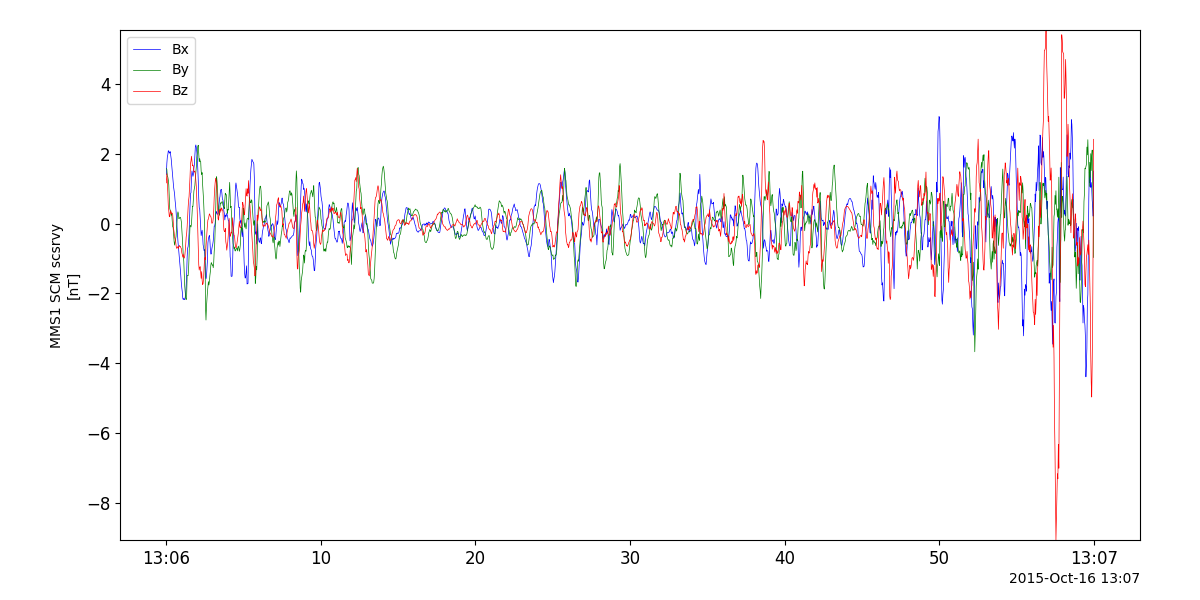
Level 3 FGM+SCM Data (FSM)
- pyspedas.mms.fsm(*args, **kwargs)
This function loads MMS FSM (FGM + SCM) data into tplot variables
- Parameters:
trange (
listofstr) – time range of interest [start time, end time] with the format ‘YYYY-MM-DD’,’YYYY-MM-DD’] or to specify more or less than a day [‘YYYY-MM-DD/hh:mm:ss’,’YYYY-MM-DD/hh:mm:ss’] Default: [‘2015-10-16/05:59’, ‘2015-10-16/06:01’]probe (
strorlistofstr) – list of probes, valid values for MMS probes are [‘1’,’2’,’3’,’4’]. Default: ‘1’data_rate (
strorlistofstr) – Valid values: ‘brst’ Default: ‘brst’level (
str) – indicates level of data processing. Default: ‘l3’datatype (
strorlistofstr) – Valid datatype for FSM is: 8khz Default: ‘8khz’get_support_data (
bool) – Data with an attribute “VAR_TYPE” with a value of “support_data” will be loaded into tplot. By default, only loads in data with a “VAR_TYPE” attribute of “data”. Default: Falsetime_clip (
bool) – Data will be clipped to the exact trange specified by the trange keyword. Default: Falsevarformat (
str) – The file variable formats to load into tplot. Wildcard character “*” is accepted. By default, all variables are loaded in. Default: None (all variables are loaded)varnames (
listofstr) – List of variable names to load (if not specified, all data variables are loaded) Default: [] (all variables are loaded)suffix (
str) – The tplot variable names will be given this suffix. By default, no suffix is added. Default: Nonenotplot (
bool) – If True, then data are returned in a hash table instead of being stored in tplot variables (useful for debugging, and access to multidimensional data products) Default: Falseavailable (
bool) – If True, simply return the available data files (without downloading) for the requested parameters Default: Falseno_update (
bool) – Set this flag to preserve the original data. if not set and newer data is found the existing data will be overwritten Default: Falsecdf_version (
str) – Specify a specific CDF version # to load (e.g., cdf_version=’4.3.0’) Default: Nonemin_version (
str) – Specify a minimum CDF version # to load Default: Nonelatest_version (
bool) – Only grab the latest CDF version in the requested time interval Default: Falsemajor_version (
bool) – Only open the latest major CDF version (e.g., X in vX.Y.Z) in the requested time interval Default: Falsealways_prompt (
bool) – Set this keyword to always prompt for the user’s username and password; useful if you accidentally save an incorrect password, or if your SDC password has changed Default: Falsespdf (
bool) – If True, download the data from the SPDF instead of the SDC Default: False
- Return type:
Listoftplot variables created.
Example: >>> import pyspedas >>> from pytplot import tplot >>> fsm_data = pyspedas.mms.mms_load_fsm(trange=[‘2015-10-16/05:59’, ‘2015-10-16/06:01’]) >>> tplot([‘mms1_fsm_b_mag_brst_l3’,’mms1_fsm_b_gse_brst_l3’,’mms1_fsm_r_gse_brst_l3’])
FSM Example
import pyspedas
from pytplot import tplot
pyspedas.mms.fsm(trange=['2015-10-16/13:06', '2015-10-16/13:07'], time_clip=True)
tplot(['mms1_fsm_b_mag_brst_l3', 'mms1_fsm_b_gse_brst_l3'])
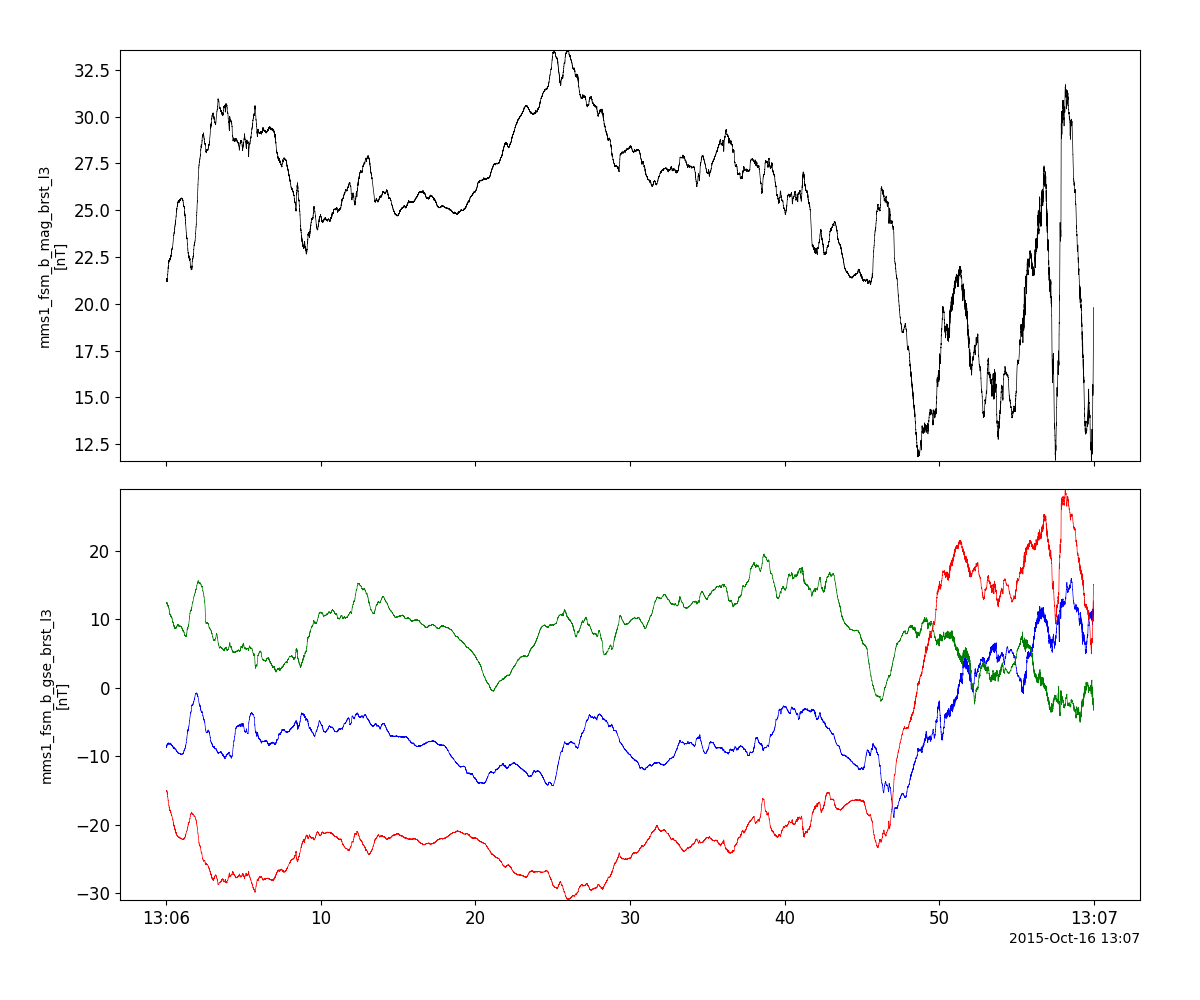
Electric field Double Probe (EDP)
- pyspedas.mms.edp(*args, **kwargs)
Load data from the MMS Electric field Double Probes (EDP) instrument
- Parameters:
trange (
listofstr) – time range of interest [start time, end time] with the format ‘YYYY-MM-DD’,’YYYY-MM-DD’] or to specify more or less than a day [‘YYYY-MM-DD/hh:mm:ss’,’YYYY-MM-DD/hh:mm:ss’] Default: [‘2015-10-16’, ‘2015-10-17’]probe (
strorlistofstr) – list of probes, valid values for MMS probes are [‘1’,’2’,’3’,’4’]. Default: ‘1’data_rate (
strorlistofstr) – instrument data rates for EDP include [‘brst’, ‘fast’, ‘slow’, ‘srvy’]. Default: ‘fast’level (
str) – indicates level of data processing. Default: ‘l2’datatype (
strorlistofstr) – Valid datatypes for EDP are: [‘dce’, ‘dcv’, ‘ace’, ‘hmfe’] Default: ‘dce’get_support_data (
bool) – Data with an attribute “VAR_TYPE” with a value of “support_data” will be loaded into tplot. By default, only loads in data with a “VAR_TYPE” attribute of “data”. Default: Falsetime_clip (
bool) – Data will be clipped to the exact trange specified by the trange keyword. Default: Falsevarformat (
str) – The file variable formats to load into tplot. Wildcard character “*” is accepted. Default: None (all variables are loaded)varnames (
listofstr) – List of variable names to load. If list is empty or not specified, all data variables are loaded) Default: []suffix (
str) – The tplot variable names will be given this suffix. By default, no suffix is added. Default: Nonenotplot (
bool) – If True, then data are returned in a hash table instead of being stored in tplot variables (useful for debugging, and access to multidimensional data products) Default: Falseavailable (
bool) – If True, simply return the available data files (without downloading) for the requested parameters Default: Falseno_update (
bool) – Set this flag to preserve the original data. if not set and newer data is found the existing data will be overwritten Default: Falsecdf_version (
str) – Specify a specific CDF version # to load (e.g., cdf_version=’4.3.0’) Default: Nonemin_version (
str) – Specify a minimum CDF version # to load Default: Nonelatest_version (
bool) – Only grab the latest CDF version in the requested time interval Default: Falsemajor_version (
bool) – Only open the latest major CDF version (e.g., X in vX.Y.Z) in the requested time interval Default: Falsealways_prompt (
bool) – Set this keyword to always prompt for the user’s username and password; useful if you accidentally save an incorrect password, or if your SDC password has changed Default: Falsespdf (
bool) – If True, download the data from the SPDF instead of the SDC Default: False
- Return type:
Listoftplot variables created.
Example: >>> import pyspedas >>> from pytplot import tplot >>> edp_vars = pyspedas.mms.mms_load_edp(trange=[‘2015-10-16’, ‘2015-10-17’], probe=’1’) >>> tplot(‘mms1_edp_dce_gse_fast_l2’)
EDP Example
import pyspedas
from pytplot import tplot
pyspedas.mms.edp(trange=['2015-10-16/13:06', '2015-10-16/13:07'], time_clip=True)
tplot('mms1_edp_dce_gse_fast_l2')
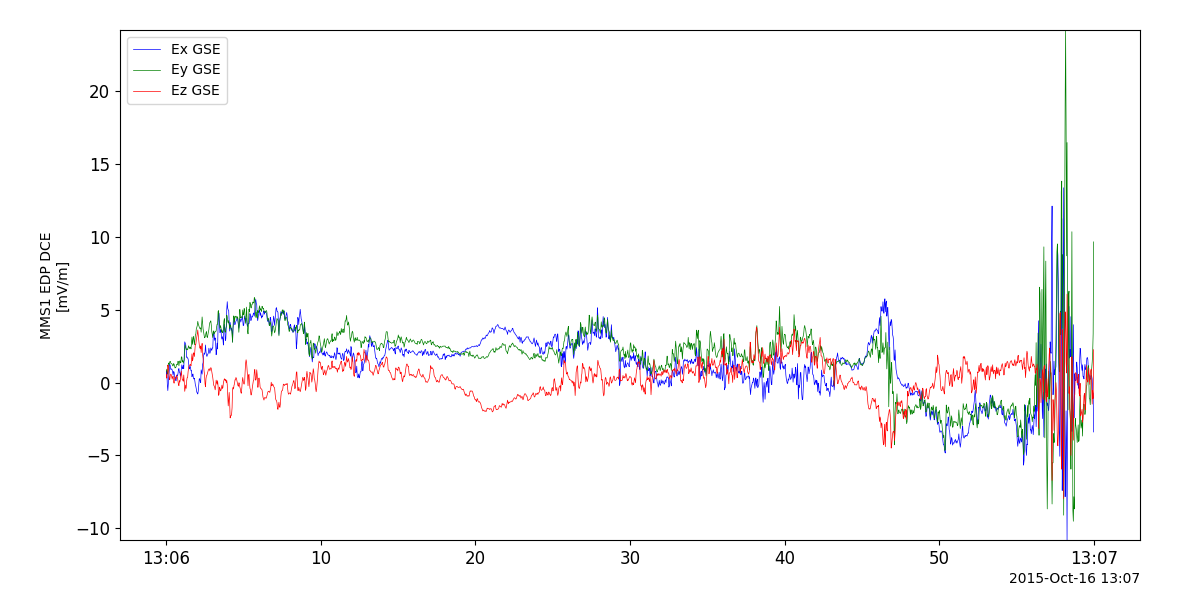
Electron Drift Instrument (EDI)
- pyspedas.mms.edi(*args, **kwargs)
Load data from the MMS Electron Drift Instrument (EDI)
- Parameters:
- trange (
listofstr) – time range of interest [start time, end time] with the format ‘YYYY-MM-DD’,’YYYY-MM-DD’] or to specify more or less than a day [‘YYYY-MM-DD/hh:mm:ss’,’YYYY-MM-DD/hh:mm:ss’] Default: [‘2016-10-16’, ‘2016-10’]
probe (
strorlistofstr) – list of probes, valid values for MMS probes are [‘1’,’2’,’3’,’4’]. Default: ‘1’data_rate (
strorlistofstr) – instrument data rates for EDI include [‘brst’, ‘fast’, ‘slow’, ‘srvy’]. Default: ‘srvy’level (
str) – indicates level of data processing. Default: ‘l2’datatype (
strorlistofstr) – Valid datatypes for EDI are: [‘efield’, ‘amb’] Default: ‘efield’get_support_data (
bool) – Data with an attribute “VAR_TYPE” with a value of “support_data” will be loaded into tplot. Default: Falsetime_clip (
bool) – Data will be clipped to the exact trange specified by the trange keyword. Default: Falsevarformat (
str) – The file variable formats to load into tplot. Wildcard character “*” is accepted. Default: None (all variables are loaded)
- trange (
- varnames: list of str
List of variable names to load If list is empty or not specified, all data variables are loaded Default: []
- suffix: str
The tplot variable names will be given this suffix. Default: None
- notplot: bool
If True, then data are returned in a hash table instead of being stored in tplot variables (useful for debugging, and access to multidimensional data products) Default: False
- available: bool
If True, simply return the available data files (without downloading) for the requested parameters Default: False
- no_update: bool
Set this flag to preserve the original data. if not set and newer data is found the existing data will be overwritten Default: False
- cdf_version: str
Specify a specific CDF version # to load (e.g., cdf_version=’4.3.0’) Default: None
- min_version: str
Specify a minimum CDF version # to load Default: None
- latest_version: bool
Only grab the latest CDF version in the requested time interval Default: False
- major_version: bool
Only open the latest major CDF version (e.g., X in vX.Y.Z) in the requested time interval Default: False
- always_prompt: bool
Set this keyword to always prompt for the user’s username and password; useful if you accidentally save an incorrect password, or if your SDC password has changed Default: False
- spdf: bool
If True, download the data from the SPDF instead of the SDC Default: False
- Return type:
Listoftplot variables created.
Example: >>> import pyspedas >>> from pytplot import tplot >>> edi_vars = pyspedas.mms.mms_load_edi(trange=[‘2016-10-16’, ‘2016-10-17’], probe=’1’) >>> tplot(‘mms1_edi_e_gse_srvy_l2’)
EDI Example
import pyspedas
from pytplot import tplot
pyspedas.mms.edi(trange=['2016-10-16/21:00', '2016-10-16/22:00'], time_clip=True)
tplot(['mms1_edi_vdrift_gse_srvy_l2', 'mms1_edi_e_gse_srvy_l2'])
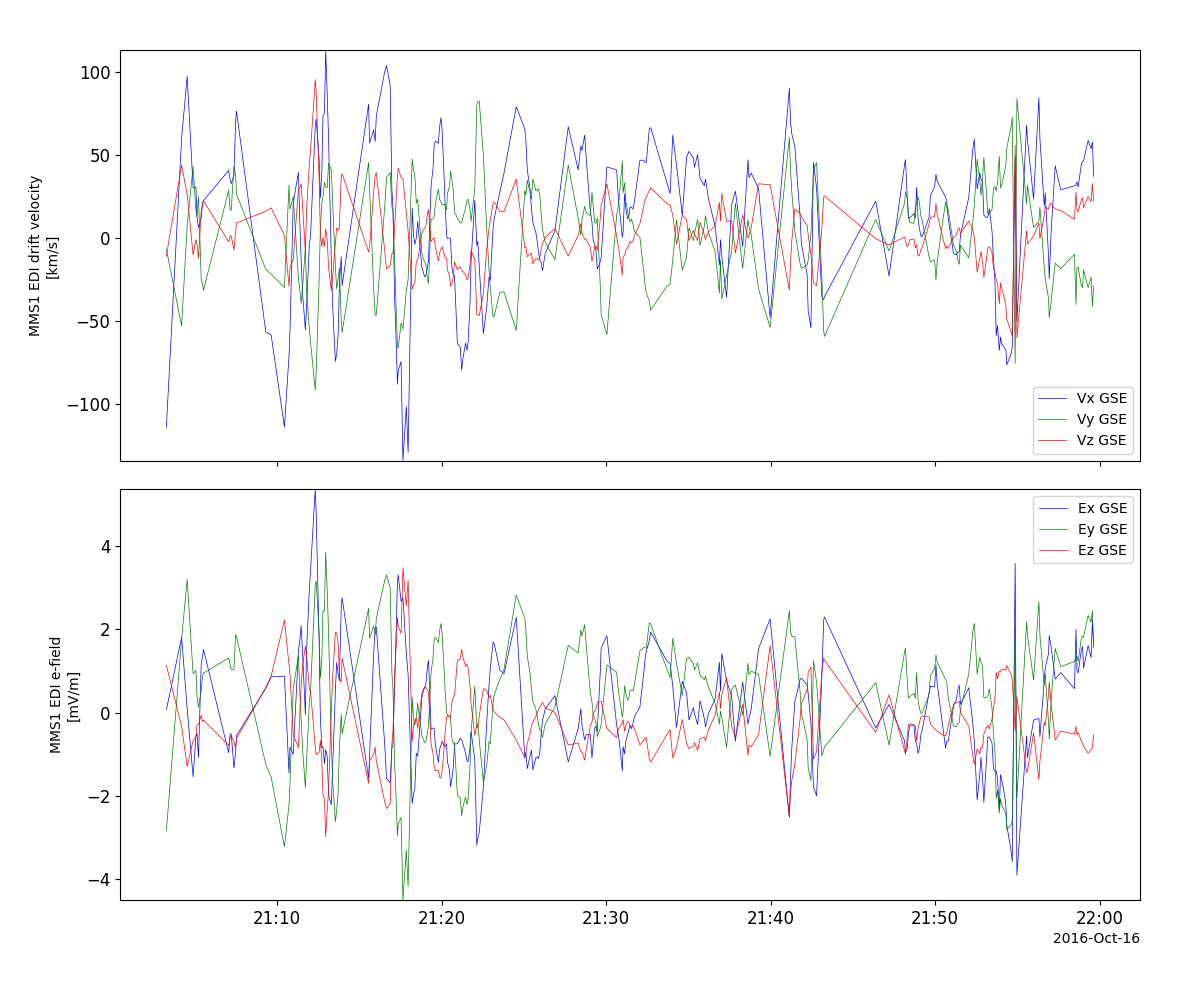
Fly’s Eye Energetic Particle Sensor (FEEPS)
- pyspedas.mms.feeps(*args, **kwargs)
Load data from the MMS Fly’s Eye Energetic Particle Sensor (FEEPS)
- Parameters:
trange (
listofstr) – time range of interest [start time, end time] with the format ‘YYYY-MM-DD’,’YYYY-MM-DD’] or to specify more or less than a day [‘YYYY-MM-DD/hh:mm:ss’,’YYYY-MM-DD/hh:mm:ss’] Default: [‘2015-10-16’,’2015-10-17’]probe (
strorlistofstr) – list of probes, valid values for MMS probes are [‘1’,’2’,’3’,’4’]. Default: ‘1’data_rate (
strorlistofstr) – instrument data rates for FEEPS include [‘brst’, ‘srvy’]. Default: ‘srvy’level (
str) – indicates level of data processing. the default if no level is specified is ‘l2’ Default: ‘l2’datatype (
strorlistofstr) –- Valid datatypes for FEEPS are:
L2, L1b: [‘electron’, ‘ion’] L1a: [‘electron-bottom’, ‘electron-top’, ‘ion-bottom’, ‘ion-top’]
Default: ‘electron’
data_units (
strorlistofstr) – Unit types to be loaded, options are ‘count_rate’, ‘intensity’ Default: [‘count_rate’, ‘intensity’]no_flatfield_corrections (
bool) – If True, no flatfield corrections are performed. Default: Falseget_support_data (
bool) – Data with an attribute “VAR_TYPE” with a value of “support_data” will be loaded into tplot. Default: Truetime_clip (
bool) – Data will be clipped to the exact trange specified by the trange keyword. Default: Falsevarformat (
str) – The file variable formats to load into tplot. Wildcard character “*” is accepted. Default: None (all variables are loaded)varnames (
listofstr) – List of variable names to load. If list is empty or not specified, all data variables are loaded. Default: []suffix (
str) – The tplot variable names will be given this suffix. By default, no suffix is added. Default: Nonenotplot (
bool) – If True, then data are returned in a hash table instead of being stored in tplot variables (useful for debugging, and access to multidimensional data products) Default: Falseavailable (
bool) – If True, simply return the available data files (without downloading) for the requested parameters Default: Falseno_update (
bool) – Set this flag to preserve the original data. if not set and newer data is found the existing data will be overwritten Default: Falsecdf_version (
str) – Specify a specific CDF version # to load (e.g., cdf_version=’4.3.0’) Default: Nonemin_version (
str) – Specify a minimum CDF version # to load Default: Nonelatest_version (
bool) – Only grab the latest CDF version in the requested time intervalmajor_version (
bool) – Only open the latest major CDF version (e.g., X in vX.Y.Z) in the requested time intervalalways_prompt (
bool) – Set this keyword to always prompt for the user’s username and password; useful if you accidentally save an incorrect password, or if your SDC password has changedspdf (
bool) – If True, download the data from the SPDF instead of the SDC
- Return type:
Listoftplot variables created.
Example: >>> import pyspedas >>> from pytplot import tplot >>> feeps_data = pyspedas.mms.mms_load_feeps(trange=[‘2015-10-16’, ‘2015-10-17’], probe=’1’, datatype=’electron’) >>> tplot([‘mms1_epd_feeps_srvy_l2_electron_intensity_omni_spin’, ‘mms1_epd_feeps_srvy_l2_electron_intensity_omni’])
FEEPS Example
import pyspedas
from pytplot import tplot
pyspedas.mms.feeps(trange=['2015-10-16', '2015-10-17'])
tplot('mms1_epd_feeps_srvy_l2_electron_intensity_omni_spin')
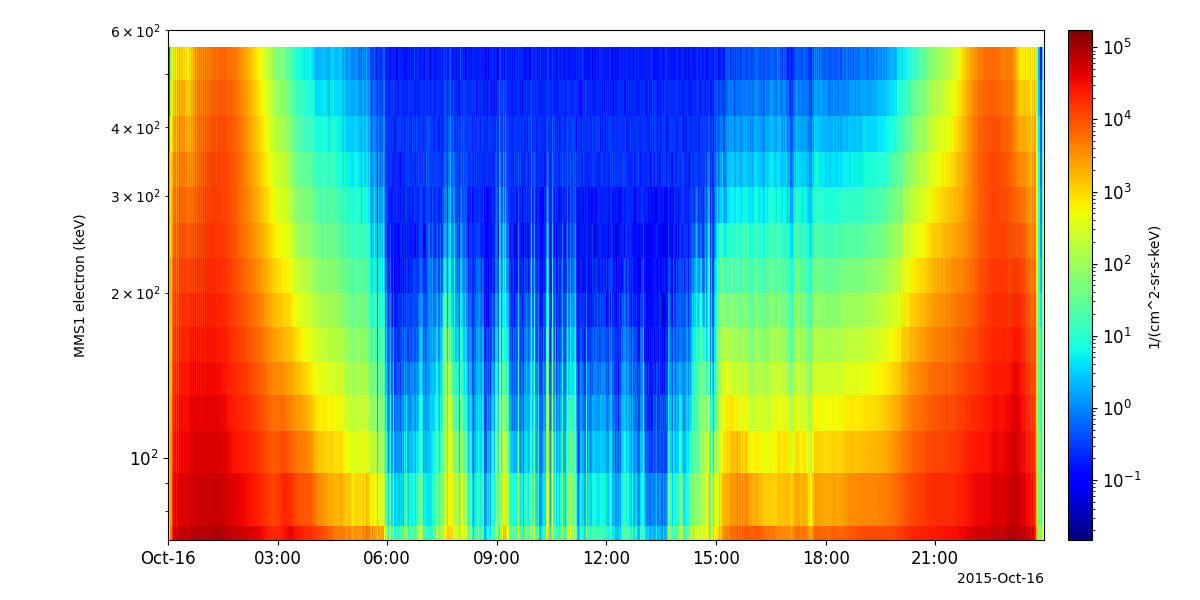
Energetic Ion Spectrometer (EIS)
- pyspedas.mms.eis(*args, **kwargs)
Load data from the MMS Energetic Ion Spectrometer (EIS)
- Parameters:
trange (
listofstr) – time range of interest [start time, end time] with the format ‘YYYY-MM-DD’,’YYYY-MM-DD’] or to specify more or less than a day [‘YYYY-MM-DD/hh:mm:ss’,’YYYY-MM-DD/hh:mm:ss’] Default: [‘2015-10-16’, ‘2015-10-17’]probe (
strorlistofstr) – list of probes, valid values for MMS probes are [‘1’,’2’,’3’,’4’]. Default: ‘1’data_rate (
strorlistofstr) – instrument data rates for EIS include [‘brst’, ‘srvy’]. Default: ‘srvy’level (
str) – indicates level of data processing. Default: ‘l2’datatype (
strorlistofstr) – Valid datatypes for EIS are: [‘extof’, ‘phxtof’, and ‘electronenergy’] Default: ‘extof’get_support_data (
bool) – Data with an attribute “VAR_TYPE” with a value of “support_data” will be loaded into tplot. Default: ‘True’time_clip (
bool) – Data will be clipped to the exact trange specified by the trange keyword. Default: ‘False’varformat (
str) – The file variable formats to load into tplot. Wildcard character “*” is accepted. Default: None (all variables are loaded)varnames (
listofstr) – List of variable names to load. If list is empty or not specified, all data variables are loaded. Default: []suffix (
str) – The tplot variable names will be given this suffix. Default: Nonenotplot (
bool) – If True, then data are returned in a hash table instead of being stored in tplot variables (useful for debugging, and access to multidimensional data products) Default: Falseavailable (
bool) – If True, simply return the available data files (without downloading) for the requested parameters Default: Falseno_update (
bool) – Set this flag to preserve the original data. if not set and newer data is found the existing data will be overwritten Default: Falsecdf_version (
str) – Specify a specific CDF version # to load (e.g., cdf_version=’4.3.0’) Default: Nonemin_version (
str) – Specify a minimum CDF version # to load Default: Nonelatest_version (
bool) – Only grab the latest CDF version in the requested time interval Default: Falsemajor_version (
bool) – Only open the latest major CDF version (e.g., X in vX.Y.Z) in the requested time interval Default: Falsealways_prompt (
bool) – Set this keyword to always prompt for the user’s username and password; useful if you accidentally save an incorrect password, or if your SDC password has changed Default: Falsespdf (
bool) – If True, download the data from the SPDF instead of the SDC Default: False
- Return type:
Listoftplot variables created.
Example: >>> import pyspedas >>> from pytplot import tplot >>> eis_vars = pyspedas.mms.mms_load_eis(trange=[‘2015-10-16’, ‘2015-10-17’], probe=’1’, datatype=[‘phxtof’, ‘extof’]) >>> # plot the non-spin averaged flux >>> tplot([‘mms1_epd_eis_srvy_l2_extof_proton_flux_omni’, ‘mms1_epd_eis_srvy_l2_phxtof_proton_flux_omni’]) >>> # plot the spin averaged flux >>> tplot([‘mms1_epd_eis_srvy_l2_extof_proton_flux_omni_spin’, ‘mms1_epd_eis_srvy_l2_phxtof_proton_flux_omni_spin’])
EIS Example
import pyspedas
from pytplot import tplot
pyspedas.mms.eis(trange=['2015-10-16', '2015-10-17'])
tplot(['mms1_epd_eis_srvy_l2_extof_proton_flux_omni', 'mms1_epd_eis_srvy_l2_extof_proton_flux_omni_spin'])
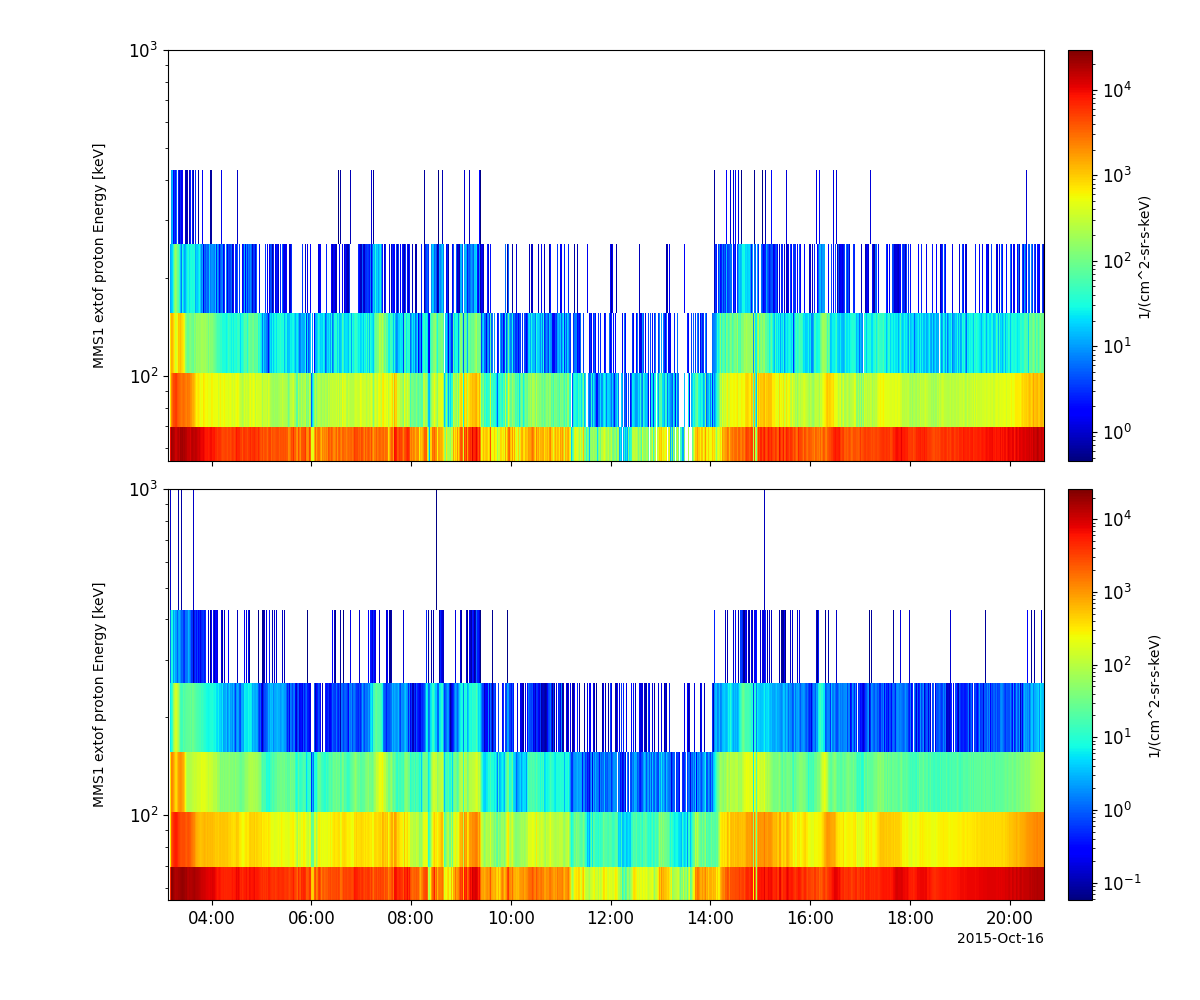
Active Spacecraft Potential Control (ASPOC)
- pyspedas.mms.aspoc(*args, **kwargs)
Load data from the MMS Active Spacecraft Potential Control (ASPOC)
- Parameters:
trange (
listofstr) – time range of interest [start time, end time] with the format ‘YYYY-MM-DD’,’YYYY-MM-DD’] or to specify more or less than a day [‘YYYY-MM-DD/hh:mm:ss’,’YYYY-MM-DD/hh:mm:ss’] Default: [‘2015-10-16’, ‘2015-10-17’]probe (
strorlistofstr) – list of probes, valid values for MMS probes are [‘1’,’2’,’3’,’4’]. Default: 1data_rate (
strorlistofstr) – instrument data rates for ASPOC include ‘srvy’, ‘sitl’. Default: ‘srvy’.level (
str) – indicates level of data processing. Default: ‘l2’datatype (
strorlistofstr) – Valid datatypes for ASPOC are: [‘asp1’, ‘asp2’, ‘aspoc’] Default: ‘aspoc’get_support_data (
bool) – Data with an attribute “VAR_TYPE” with a value of “support_data” will be loaded into tplot. Default: Falsetime_clip (
bool) – Data will be clipped to the exact trange specified by the trange keyword. Default: Falsevarformat (
str) – The file variable formats to load into tplot. Wildcard character “*” is accepted. Default: None (all variables are loaded in)varnames (
listofstr) – List of variable names to load. If list is empty or unspecified, all data variables are loaded. Default: empty list (all data variables are loaded)suffix (
str) – The tplot variable names will be given this suffix. Default: Nonenotplot (
bool) – If True, then data are returned in a hash table instead of being stored in tplot variables (useful for debugging, and access to multidimensional data products) Default: Falseavailable (
bool) – If True, simply return the available data files (without downloading) for the requested parameters Default: Falseno_update (
bool) – Set this flag to preserve the original data. if not set and newer data is found the existing data will be overwritten Default: Falsecdf_version (
str) – Specify a specific CDF version # to load (e.g., cdf_version=’4.3.0’) Default: Nonemin_version (
str) – Specify a minimum CDF version # to load Default: Nonelatest_version (
bool) – Only grab the latest CDF version in the requested time interval Default: Falsemajor_version (
bool) – Only open the latest major CDF version (e.g., X in vX.Y.Z) in the requested time interval Default: Falsealways_prompt (
bool) – Set this keyword to always prompt for the user’s username and password; useful if you accidentally save an incorrect password, or if your SDC password has changed Default: Falsespdf (
bool) – If True, download the data from the SPDF instead of the SDC Default: False
- Return type:
Listoftplot variables created.
Example: >>> import pyspedas >>> from pytplot import tplot >>> asp_data = pyspedas.mms.mms_load_aspoc(trange=[‘2015-10-16’, ‘2015-10-17’], probe=’1’) >>> tplot(‘mms1_aspoc_ionc_l2’)
ASPOC Example
import pyspedas
from pytplot import tplot
pyspedas.mms.aspoc(trange=['2015-10-16', '2015-10-17'])
tplot(['mms1_aspoc_ionc_l2', 'mms1_asp1_ionc_l2', 'mms1_asp2_ionc_l2'])
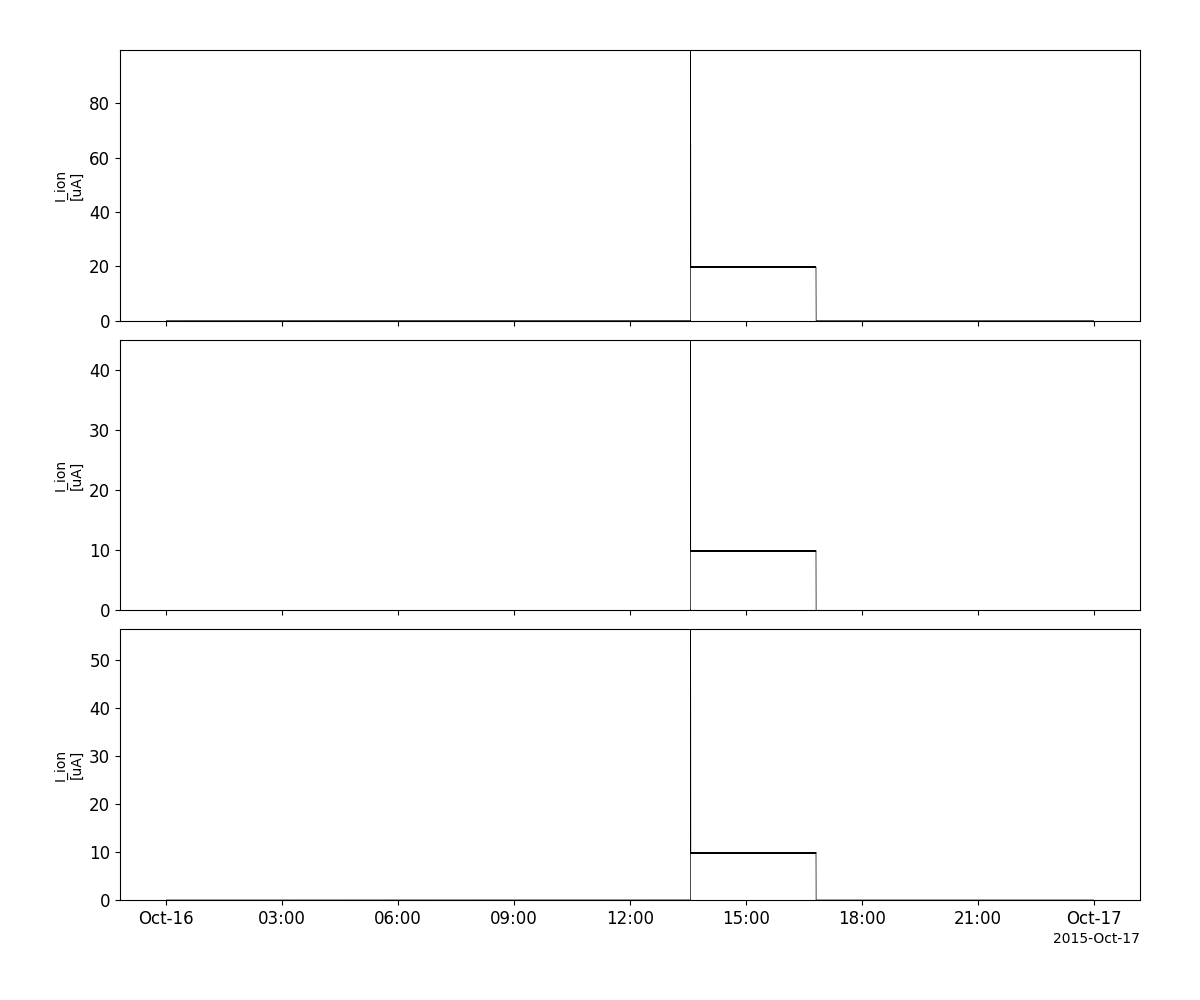
Fast Plasma Investigation (FPI)
- pyspedas.mms.fpi(*args, **kwargs)
Load data from the MMS Fast Plasma Investigation (FPI)
- Parameters:
trange (
listofstr) – time range of interest [start time, end time] with the format ‘YYYY-MM-DD’,’YYYY-MM-DD’] or to specify more or less than a day [‘YYYY-MM-DD/hh:mm:ss’,’YYYY-MM-DD/hh:mm:ss’] Default: [‘2015-10-16’, ‘2015-10-17’]probe (
strorlistofstr) – list of probes, valid values for MMS probes are [‘1’,’2’,’3’,’4’]. Default: ‘1’data_rate (
strorlistofstr) – instrument data rates for FPI include ‘brst’, ‘fast’. Default: ‘fast’level (
str) – indicates level of data processing. Valid options: ‘l2’, ‘ql’ Default: ‘l2’datatype (
strorlistofstr) –- Valid datatypes for FPI are:
‘des-moms’, ‘dis-moms’, ‘des-dist’, ‘dis-dist’, ‘des’, ‘dis’ Defaults: [‘des-moms’, ‘dis-moms’, ‘des-dist’ , ‘dis-dist’] (for level != ‘ql’ or unspecified) [‘des’, ‘dis’] (for level == ‘ql’)
get_support_data (
bool) – Data with an attribute “VAR_TYPE” with a value of “support_data” will be loaded into tplot. Default: Falsetime_clip (
bool) – Data will be clipped to the exact trange specified by the trange keyword. Default: Falsevarformat (
str) – The file variable formats to load into tplot. Wildcard character “*” is accepted. Default: None (All variables are loaded)varnames (
listofstr) – List of variable names to load. If list is empty or not specified, all data variables are loaded Default: [] (all variables are loaded)suffix (
str) – The tplot variable names will be given this suffix. Default: Nonecenter_measurement (
bool) – If True, the CDF epoch variables are time-shifted to the middle of the accumulation interval by their DELTA_PLUS_VAR and DELTA_MINUS_VAR variable attributes Default: Falsenotplot (
bool) – If True, then data are returned in a hash table instead of being stored in tplot variables (useful for debugging, and access to multidimensional data products) Default: Falseavailable (
bool) – If True, simply return the available data files (without downloading) for the requested parameters Default: Falseno_update (
bool) – Set this flag to preserve the original data. if not set and newer data is found the existing data will be overwritten Default: Falsecdf_version (
str) – Specify a specific CDF version # to load (e.g., cdf_version=’4.3.0’) Default: Nonemin_version (
str) – Specify a minimum CDF version # to load Default: Nonelatest_version (
bool) – Only grab the latest CDF version in the requested time interval Default: Falsemajor_version (
bool) – Only open the latest major CDF version (e.g., X in vX.Y.Z) in the requested time interval Default: Falsealways_prompt (
bool) – Set this keyword to always prompt for the user’s username and password; useful if you accidentally save an incorrect password, or if your SDC password has changed Default: Falsespdf (
bool) – If True, download the data from the SPDF instead of the SDC Default: False
- Return type:
Listoftplot variables created.
Example: >>> import pyspedas >>> from pytplot import tplot >>> fpi_vars = pyspedas.mms.mms_load_fpi(trange=[‘2015-10-16’, ‘2015-10-17’], datatype=’dis-moms’) >>> tplot([‘mms1_dis_bulkv_gse_fast’, ‘mms1_dis_numberdensity_fast’])
FPI Example
import pyspedas
from pytplot import tplot
pyspedas.mms.fpi(trange=['2015-10-16', '2015-10-17'], datatype='des-moms')
tplot(['mms1_des_energyspectr_omni_fast', 'mms1_des_bulkv_gse_fast', 'mms1_des_numberdensity_fast'])
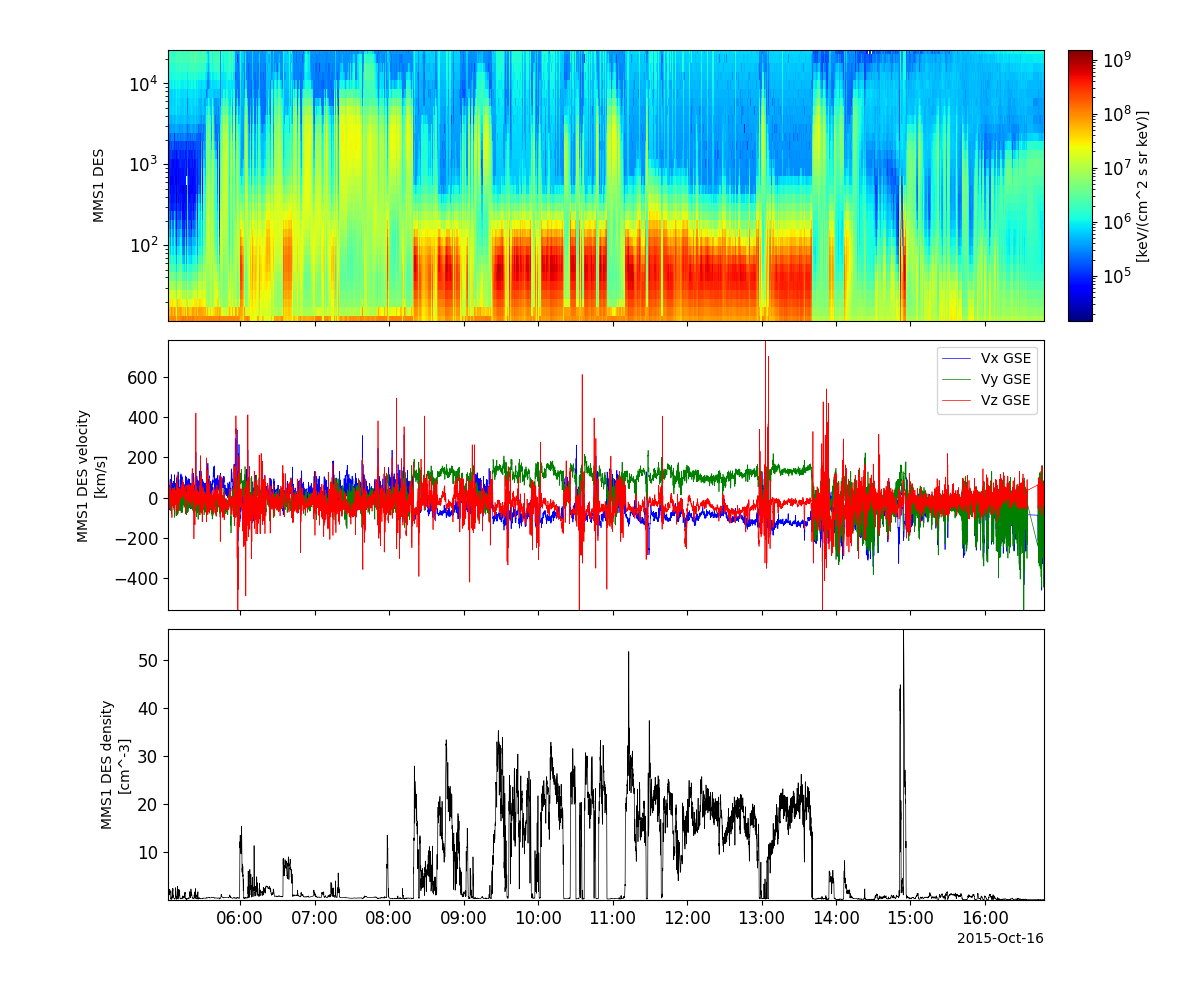
Hot Plasma Composition Analyzer (HPCA)
- pyspedas.mms.hpca(*args, **kwargs)
Load data from the MMS Hot Plasma Composition Analyzer (HPCA)
- Parameters:
trange (
listofstr) – time range of interest [start time, end time] with the format ‘YYYY-MM-DD’,’YYYY-MM-DD’] or to specify more or less than a day [‘YYYY-MM-DD/hh:mm:ss’,’YYYY-MM-DD/hh:mm:ss’] Default: [‘2015-10-16’, ‘2015-10-17’]probe (
strorlistofstr) – list of probes, valid values for MMS probes are [‘1’,’2’,’3’,’4’]. Default: ‘1’data_rate (
strorlistofstr) – instrument data rates for HPCA include ‘brst’, ‘srvy’. Default: ‘srvy’level (
str) – indicates level of data processing Default: ‘l2’datatype (
strorlistofstr) – Valid datatypes for HPCA are ‘moments’ and ‘ion’ Default: ‘moments’get_support_data (
bool) – Data with an attribute “VAR_TYPE” with a value of “support_data” will be loaded into tplot. Default: Truevarformat (
str) – The file variable formats to load into tplot. Wildcard character “*” is accepted. Default: None (all variables are loaded)varnames (
listofstr) – List of variable names to load. If list is empty or not specified, all data variables are loaded) Default: [] (all variables are loaded)time_clip (
bool) – Data will be clipped to the exact trange specified by the trange keyword. Default: Falsesuffix (
str) – The tplot variable names will be given this suffix. Default: Nonecenter_measurement (
bool) – If True, the CDF epoch variables are time-shifted to the middle of the accumulation interval by their DELTA_PLUS_VAR and DELTA_MINUS_VAR variable attributes Default: Falsenotplot (
bool) – If True, then data are returned in a hash table instead of being stored in tplot variables (useful for debugging, and access to multidimensional data products) Default: Falseavailable (
bool) – If True, simply return the available data files (without downloading) for the requested parameters Default: Falseno_update (
bool) – Set this flag to preserve the original data. if not set and newer data is found the existing data will be overwritten Default: Falsecdf_version (
str) – Specify a specific CDF version # to load (e.g., cdf_version=’4.3.0’) Default: Nonemin_version (
str) – Specify a minimum CDF version # to load Default: Nonelatest_version (
bool) – Only grab the latest CDF version in the requested time interval Default: Falsemajor_version (
bool) – Only open the latest major CDF version (e.g., X in vX.Y.Z) in the requested time interval Default: Falsealways_prompt (
bool) – Set this keyword to always prompt for the user’s username and password; useful if you accidentally save an incorrect password, or if your SDC password has changed Default: Falsespdf (
bool) – If True, download the data from the SPDF instead of the SDC Default: False
- Return type:
Listoftplot variables created.
Example: >>> import pyspedas >>> from pytplot import tplot >>> mom_vars = pyspedas.mms.mms_load_hpca(trange=[‘2015-10-16’, ‘2015-10-17’], datatype=’moments’) >>> tplot([‘mms1_hpca_hplus_number_density’, ‘mms1_hpca_hplus_ion_bulk_velocity’]) >>> # load the ion data (support data, fluxes, phase space densities, all ion data samples are n x m arrays >>> ion_vars = pyspedas.mms.mms_load_hpca(trange=[‘2016-10-16’, ‘2016-10-17’], datatype=’ion’)
HPCA Example
import pyspedas
from pytplot import tplot
pyspedas.mms.hpca(trange=['2015-10-16', '2015-10-17'], datatype='moments')
tplot(['mms1_hpca_hplus_number_density', 'mms1_hpca_hplus_ion_bulk_velocity', 'mms1_hpca_hplus_scalar_temperature'])
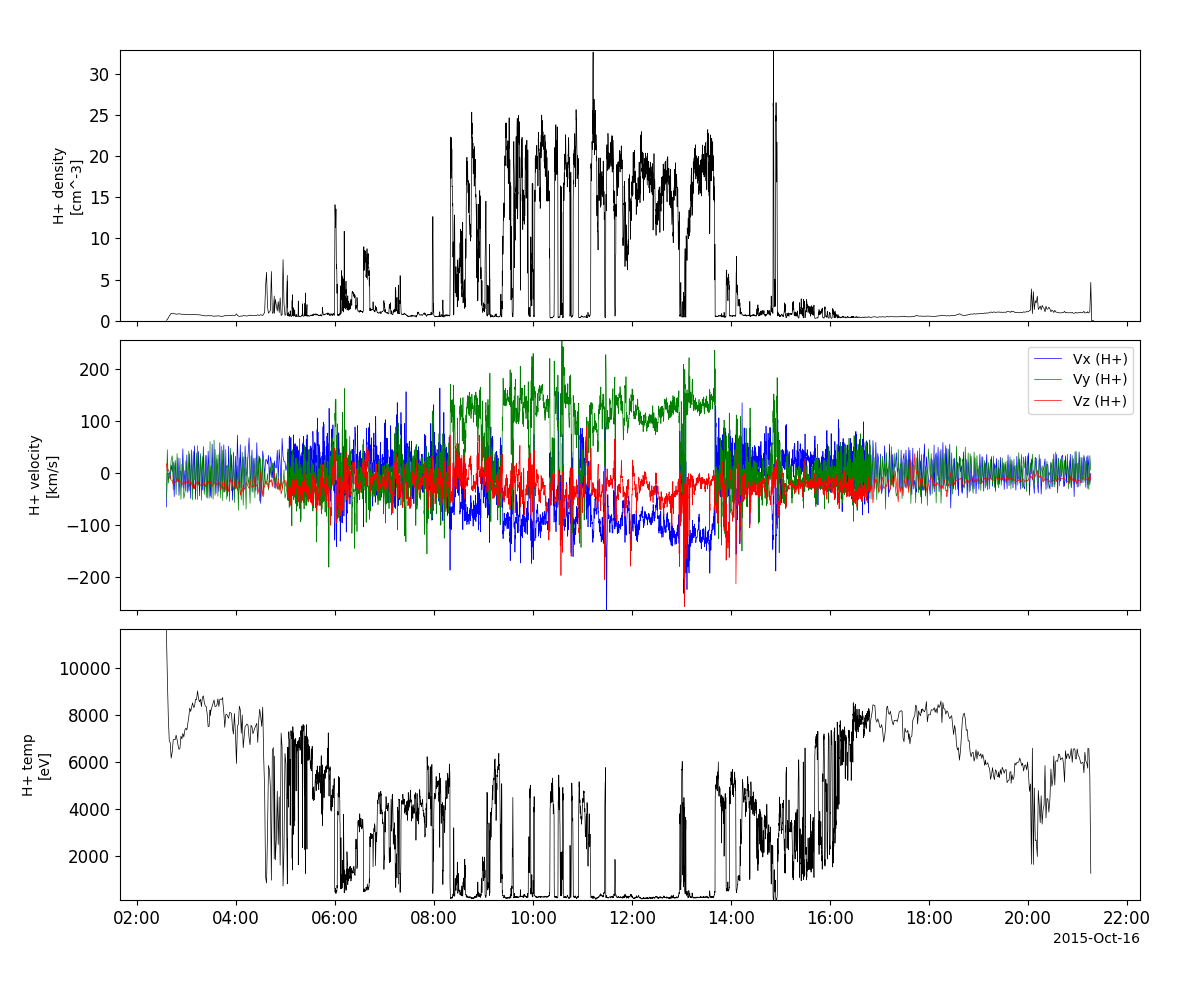
Magnetic Ephemeris Coordinates (MEC)
- pyspedas.mms.mec(*args, **kwargs)
Load the attitude/ephemeris data from the MMS MEC (Mission Ephemeris and Coordinates) files
- Parameters:
trange (
listofstr) – time range of interest [start time, end time] with the format ‘YYYY-MM-DD’,’YYYY-MM-DD’] or to specify more or less than a day [‘YYYY-MM-DD/hh:mm:ss’,’YYYY-MM-DD/hh:mm:ss’] Default: [‘2015-10-16’, ‘2015-10-17’]probe (
strorlistofstr) – list of probes, valid values for MMS probes are [‘1’,’2’,’3’,’4’]. Default: ‘1’data_rate (
strorlistofstr) – instrument data rates for MEC include [‘brst’, ‘srvy’]. Default: ‘srvy’level (
str) – indicates level of data processing. Default: ‘l2’datatype (
strorlistofstr) – Valid datatypes for MEC are: [‘ephts04d’, ‘epht89q’, ‘epht89d’] Default: ‘epht89q’get_support_data (
bool) – Data with an attribute “VAR_TYPE” with a value of “support_data” will be loaded into tplot. Default: Falsetime_clip (
bool) – Data will be clipped to the exact trange specified by the trange keyword. Default: Falsevarformat (
str) – The file variable formats to load into tplot. Wildcard character “*” is accepted. Default: None (all variables are loaded)varnames (
listofstr) – List of variable names to load. If list is empyt or not specified, all data variables are loaded) Default: [] (all variables are loaded)suffix (
str) – The tplot variable names will be given this suffix. Default: Nonenotplot (
bool) – If True, then data are returned in a hash table instead of being stored in tplot variables (useful for debugging, and access to multidimensional data products) Default: Falseavailable (
bool) – If True, simply return the available data files (without downloading) for the requested parameters Default: Falseno_update (
bool) – Set this flag to preserve the original data. if not set and newer data is found the existing data will be overwritten Default: Falsecdf_version (
str) – Specify a specific CDF version # to load (e.g., cdf_version=’4.3.0’) Default: Nonemin_version (
str) – Specify a minimum CDF version # to load Default: Nonelatest_version (
bool) – Only grab the latest CDF version in the requested time interval Default: Falsemajor_version (
bool) – Only open the latest major CDF version (e.g., X in vX.Y.Z) in the requested time interval Default: Falsealways_prompt (
bool) – Set this keyword to always prompt for the user’s username and password; useful if you accidentally save an incorrect password, or if your SDC password has changed Default: Falsespdf (
bool) – If True, download the data from the SPDF instead of the SDC Default: False
Notes
The default datatype was changed to ‘epht89q’ on 15Nov2021. There are sometimes issues with creating the Tsyganenko 04 data products, which leads to the ‘epht04d’ files not being available. The ‘epht89d’ files contain the same ephemeris data - the only difference are the data products that rely on the field model.
- Return type:
Listoftplot variables created.
Example: >>> import pyspedas >>> from pytplot import tplot >>> mec_data = pyspedas.mms.mms_load_mec(trange=[‘2015-10-16’, ‘2015-10-17’], probe=’1’) >>> tplot([‘mms1_mec_r_gsm’, ‘mms1_mec_v_gsm’])
MEC Example
import pyspedas
from pytplot import tplot
pyspedas.mms.mec(trange=['2015-10-16', '2015-10-17'])
tplot(['mms1_mec_r_gsm', 'mms1_mec_v_gsm'])
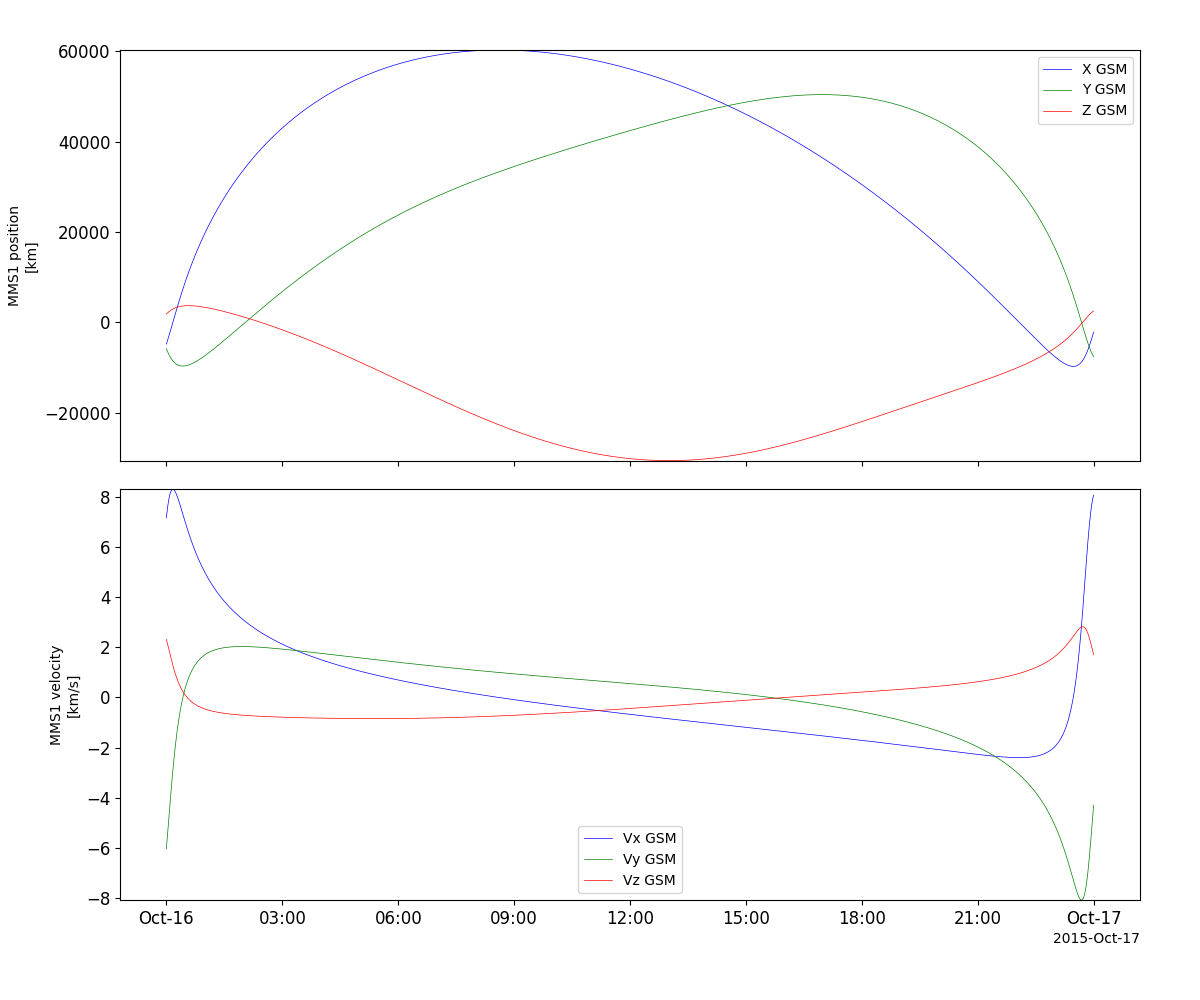
- pyspedas.mms.state(*args, **kwargs)
This function loads the state (ephemeris and attitude) data from the ASCII files into tplot variables
- Parameters:
trange (
listofstr) – time range of interest [start time, end time] with the format ‘YYYY-MM-DD’,’YYYY-MM-DD’] or to specify more or less than a day [‘YYYY-MM-DD/hh:mm:ss’,’YYYY-MM-DD/hh:mm:ss’] Default: [‘2015-10-16’, ‘2015-10-17’]probe (
strorlistofstr) – list of probes, valid values for MMS probes are [‘1’,’2’,’3’,’4’]. Default: ‘1’level (
str) – indicates level of data (options: ‘def’ (definitive), ‘pred’ (predicted) Default: ‘def’datatypes (
strorlistofstr) – Datatypes for state data to be loaded (options: ‘pos’, ‘vel’, ‘spinras’, ‘spindec’) Default: [‘pos’, ‘vel’]suffix (
str) – The tplot variable names will be given this suffix. Default: Noneno_update (
bool) – Set this flag to preserve the original data. if not set and newer data is found the existing data will be overwritten Default: Falsepred_or_def (
bool) – Load definitive or predicted (if definitive isn’t available); defaults to True Default: True
- Return type:
Listoftplot variables created.
Example: >>> import pyspedas >>> from pytplot import tplot >>> pos_data = pyspedas.mms.mms_load_state(trange=[‘2015-10-16’, ‘2015-10-17’], probe=’1’, datatypes=’pos’, level=’def’) >>> tplot(‘mms1_defeph_pos’)
State Example
import pyspedas
from pytplot import tplot
pyspedas.mms.state(trange=['2020-12-16', '2020-12-17'])
tplot(['mms1_defeph_pos', 'mms1_defeph_vel'])
